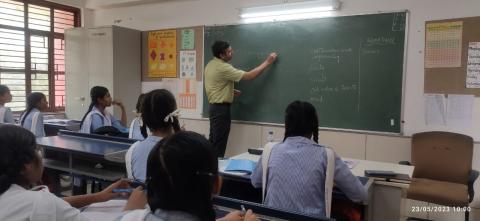
The Case for Mathematics Education During School Years
Recently, the results of Board Exams have been declared across the country. This is the time when both institutions and individuals are analyzing the results. In public schools (government schools), it is often observed that mathematics is where most children fail. Parents, teachers, and various stakeholders come up with arguments: Why is it necessary for every child to study mathematics? How do the concepts learned in mathematics during their school days help them in day-to-day life? To be more precise, it is often asked how algebra or geometry helps in living a quality daily life. People then quote examples of several individuals who lead exemplary lives without having studied mathematics.
These arguments are so dominant that even boards have decided to tone down the difficulty of the discipline. For example, in the CBSE board, children are offered the choice to go with Course A or Course B in mathematics. Students who find mathematics difficult often opt for Course B. In open schooling, there are arrangements where students can obtain a matriculation degree even without passing a mathematics paper. When the argument is so strong and questions how it helps in everyday life, why do we still continue with mathematics?
As a person from the humanities domain, I should be happy with these arguments, but I am not. I strongly believe that mathematics should continue to be offered to all students until grade 10, and efforts to dilute the mathematics syllabus should be discouraged. Obviously, the question arises: why don't I want to see the relation between what is learned in the classroom and its connection to daily life? Of course, I want to address that and I believe in advocating for connecting classroom learning to daily life experiences. I see that the mathematics lessons we have in the classroom are directly related to our daily life experiences. So how is algebra connected to our lived experiences?
I don't want to resort to rudimentary arguments that are often given, such as it helps us build bridges, and so on. I want to draw the reader's attention to deeper philosophical reasons why I want mathematics lessons for every child until grade 10.
For a significant part of human evolution, our lives have been deeply influenced by stereotypes and dogmas. In Europe, it was called the Dark Age. It hasn't been long since reason replaced dogmas in determining the key affairs of human life. The replacement is not complete and may never be given the diversity of human life. Scientific thinking and reasoning are closely connected, and mathematics provides the foundational tools for reason to flourish. Thus, we cannot imagine a rational human being without having access to the most basic and fundamental tools that mathematics offers. Most democratic societies are committed to promoting scientific temper, which is again closely related to the idea of rational human beings.
One may argue that it's fine for mathematics to have an important role to play, and some people will study it and progress in the fields of science, technology, biology, and other disciplines where mathematics is essential. They will make inventions that serve humanity. But why should everyone study mathematics?
It took hundreds of years to convince people that doctors can help sick people recover from illnesses, not exorcism. It took several years to gain trust in engineers who design safe aircraft for the common people to fly in. And today, everyone believes in the engineers who design bridges that people walk across. For almost 10 years, we expose students to mathematics lessons. Many of them may not excel in mathematical lessons, but they are surrounded by mathematical operations for 10 years, which unconsciously instills a belief in the scientific system of knowledge. Eventually, they start believing in and appreciating the world of science and mathematics. Many of our children who graduate from school may not be able to perform complex mathematical operations, but they believe in the importance of mathematical operations and the scientific temper. They believe that understanding mathematical operations is of supreme importance. This belief helps us build a society that appreciates the scientific temper. Mathematics lessons are not just for teaching our students mathematical operations; they also help them develop trust in the scientific world. As time goes by, we can see significant progress. It is difficult to find a person today who doesn't believe in doctors, who doesn't trust airplanes, or who refuses to cross a bridge built by engineers. This outcome can be attributed to the mathematics lessons they received during their school years.
- Log in to post comments
